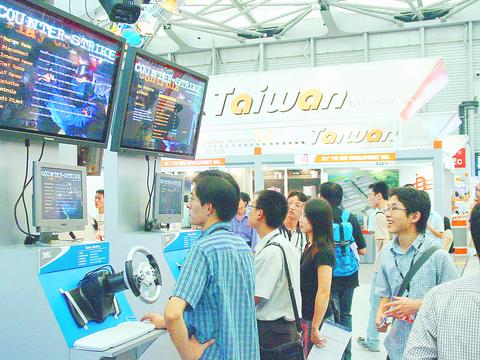Taiwanese businesses dominate this year's CeBIT Asia in Shanghai, despite the fact that some of the nation's top names declined to make the trek.
CeBIT Asia is the younger cousin of the world's largest information-technology fair CeBIT which is held in Hannover annually. According to show organizers, the second annual IT show plays host to more than 540 companies from 25 countries, up marginally from the inaugural event last year which saw 509 exhibitors from 23 countries.
Taiwanese account for 161 of those exhibitors and more than a quarter of the 12,000m2 in floor space at the show.

PHOTO: TIM CULPAN
Missing from the show, however, are some of Taiwan's biggest names, such as Acer Inc (
"They decided to change their marketing strategy and so wanted to be part of the forum, but not the show," said one organizer.
According to an earlier press release, organizers were hoping to draw 700 exhibitors to the show this year.
However, Deutsche Messe Public Relations Manager Monika Brandt denied that figure was ever in their planning. She said that 700 is the goal for next year. The official show guide states "some 600" exhibitors were at last year's show, while the actual figure is 100 lower.
Organizers have been very touchy about bad press for the event, at one stage calling in two reporters to berate them for unfavorable coverage in the lead up to the show. Brandt said she's not worried by the absence of some big names.
"We're working on it -- Rome wasn't built overnight," she said.
The show runs head to head with Taiwan's Computex in the IT trade fair sector, with the Taiwan event being older and larger. Brandt claimed not to know about Computex.
CeBIT Hannover, Comdex in Las Vegas and Computex Taipei are the world's three largest IT trade fairs, with big and small names flocking to the events to show off the latest technologies and serves as a venue for buyers and sellers to do deals.
"There's a lot of global players at CeBIT Hannover and we'd like to lead them over to this market," said Brandt.
South Korea's Samsung and Japan's Panasonic both have large displays with song-and-dance girls, while AMD Inc and Intel Corp are both clearly visible at the show.
Leading the Taiwan contingent are VIA Technologies Inc (威盛電子), AOpen Inc and Elitegroup Computer System Co (精英電腦). Dozens of smaller vendors also fill the Taiwan Pavilion, selling everything from PC cases to wireless routers. While the pavilion bears the name Taiwan, and its stats are counted among the foreign exhibitors, the show guide refers to "Taiwan province."
Few new products are on display, with the show being a chance for vendors to find local buyers and distributors. Despite organizers claims of being a regional affair, there's a real sense that this is all about the Chinese market.

BYPASSING CHINA TARIFFS: In the first five months of this year, Foxconn sent US$4.4bn of iPhones to the US from India, compared with US$3.7bn in the whole of last year Nearly all the iPhones exported by Foxconn Technology Group (富士康科技集團) from India went to the US between March and last month, customs data showed, far above last year’s average of 50 percent and a clear sign of Apple Inc’s efforts to bypass high US tariffs imposed on China. The numbers, being reported by Reuters for the first time, show that Apple has realigned its India exports to almost exclusively serve the US market, when previously the devices were more widely distributed to nations including the Netherlands and the Czech Republic. During March to last month, Foxconn, known as Hon Hai Precision Industry

Taiwan Semiconductor Manufacturing Co (TSMC, 台積電) and the University of Tokyo (UTokyo) yesterday announced the launch of the TSMC-UTokyo Lab to promote advanced semiconductor research, education and talent development. The lab is TSMC’s first laboratory collaboration with a university outside Taiwan, the company said in a statement. The lab would leverage “the extensive knowledge, experience, and creativity” of both institutions, the company said. It is located in the Asano Section of UTokyo’s Hongo, Tokyo, campus and would be managed by UTokyo faculty, guided by directors from UTokyo and TSMC, the company said. TSMC began working with UTokyo in 2019, resulting in 21 research projects,

Ashton Hall’s morning routine involves dunking his head in iced Saratoga Spring Water. For the company that sells the bottled water — Hall’s brand of choice for drinking, brushing his teeth and submerging himself — that is fantastic news. “We’re so thankful to this incredible fitness influencer called Ashton Hall,” Saratoga owner Primo Brands Corp’s CEO Robbert Rietbroek said on an earnings call after Hall’s morning routine video went viral. “He really helped put our brand on the map.” Primo Brands, which was not affiliated with Hall when he made his video, is among the increasing number of companies benefiting from influencer

Quanta Computer Inc (廣達) chairman Barry Lam (林百里) yesterday expressed a downbeat view about the prospects of humanoid robots, given high manufacturing costs and a lack of target customers. Despite rising demand and high expectations for humanoid robots, high research-and-development costs and uncertain profitability remain major concerns, Lam told reporters following the company’s annual shareholders’ meeting in Taoyuan. “Since it seems a bit unworthy to use such high-cost robots to do household chores, I believe robots designed for specific purposes would be more valuable and present a better business opportunity,” Lam said Instead of investing in humanoid robots, Quanta has opted to invest